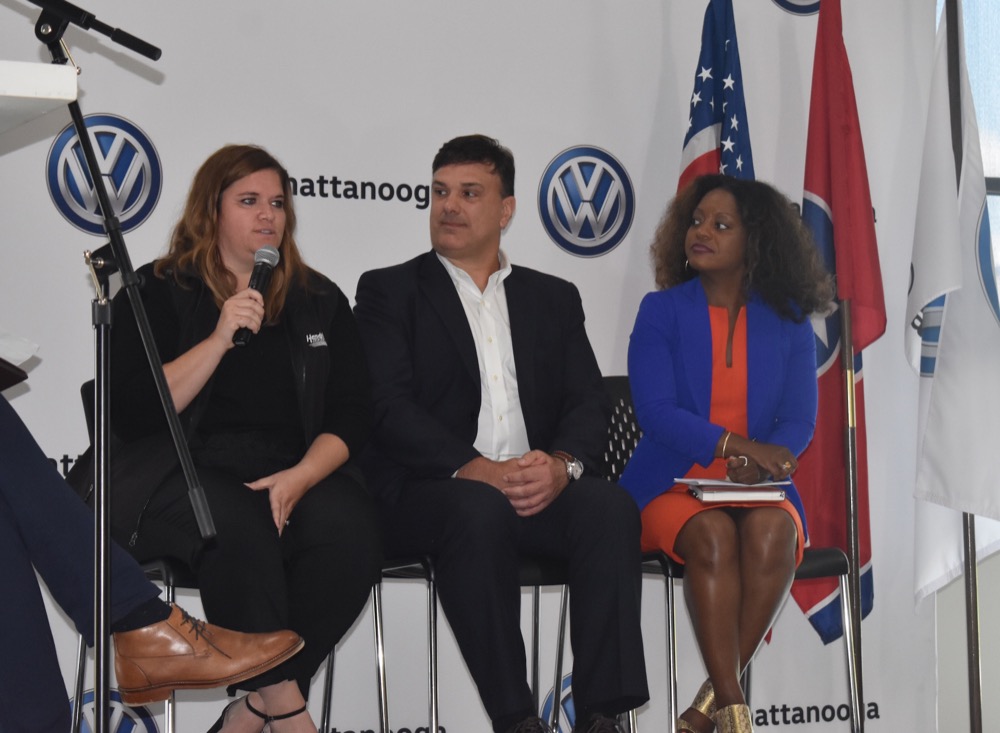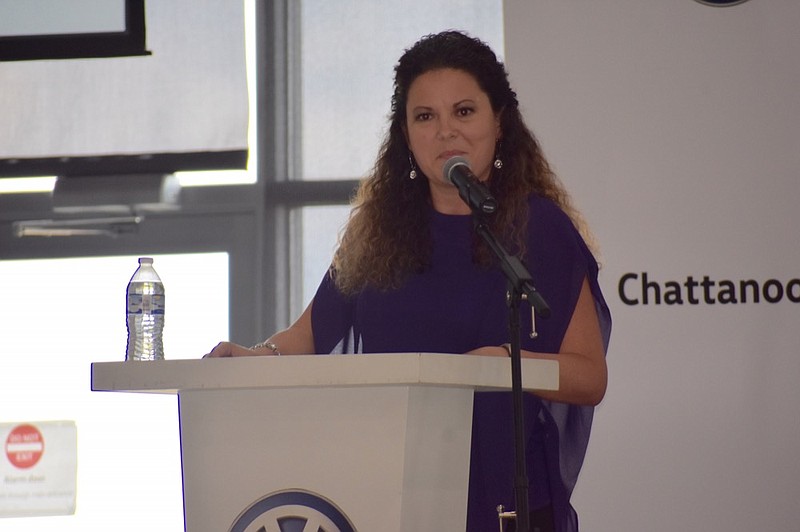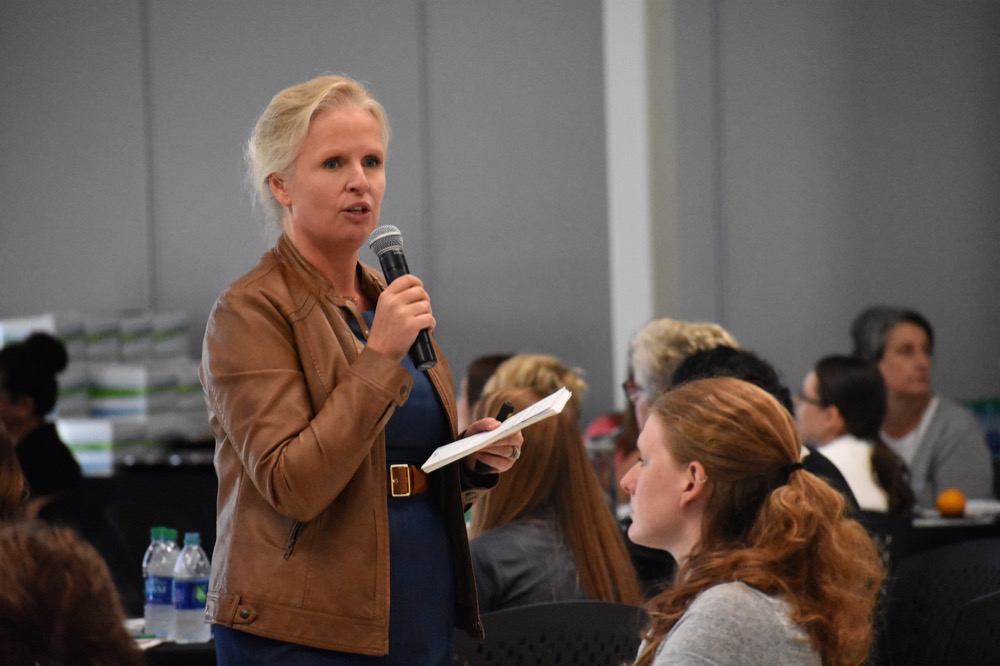 From left to right: William "Buddy" Scarborough, a University of Illinois Chicago researcher and author; Megan Horn, process engineer at Hendrick Motorsports; Mark Nation, consultant/author and owner of Nation Leadership; and Chantelle Roberson, assistant vice president of senior regulatory counsel at Unum, lead a panel at the "Minding the Gaps" women's workforce symposium on Thursday. / Staff photo by Allison Shirk
From left to right: William "Buddy" Scarborough, a University of Illinois Chicago researcher and author; Megan Horn, process engineer at Hendrick Motorsports; Mark Nation, consultant/author and owner of Nation Leadership; and Chantelle Roberson, assistant vice president of senior regulatory counsel at Unum, lead a panel at the "Minding the Gaps" women's workforce symposium on Thursday. / Staff photo by Allison Shirk
Chantelle Roberson remembers 20 years ago when she started her own law firm and faced discrimination often. Roberson, a black female, had more experience than the other male at her firm, was the managing partner, and yet, everywhere they went people assumed she worked for him.
"Fast forward 20 years and he and I can now laugh about that - sometimes," Roberson said to a room full of women at the Volkswagen Conference Center Thursday.
She received a few laughs from the crowd and a lot of empathetic head nods.
The now-Unum assistant vice president and senior regulatory counsel was one of the panelists at the "Minding the Gaps" women's workforce symposium organized Thursday as part of the "All Lanes Open" initiative to reduce gender disparities in the workplace. Women - and a handful of men - attended from places around the Chattanooga area, including Shaw Industries, the University of Tennessee at Chattanooga, Chattanooga State Community College, Unum, Volkswagen and more.
University of Illinois Chicago researcher and author William "Buddy" Scarborough introduced some research on gender disparities in Chattanooga that many said they found "surprising" and even "tragic."
Based on 2010 Census figures, women in Chattanooga make 22 percent less than men, which is higher than the national average - 19 percent - and other cities in the region.
In Nashville, the gender wage gap is 12 percent; Memphis, 16 percent; Birmingham, 18 percent; and Atlanta, 16 percent.
When it comes to women in management positions, only 36 percent of women hold managerial roles in Chattanooga compared to 40 percent of women nationally. In Nashville, 43 percent hold management positions; Memphis, 40 percent; Birmingham, 42 percent; and Atlanta, 40 percent.
Through Scarborough's research he found that cities with larger gender wage gaps also have lower median wages. Areas with more gender segregation in the profession also had a decrease in innovation.
 From left to right: Megan Horn, process engineer at Hendrick Motorsports; Mark Nation, consultant/author and owner of Nation Leadership; and Chantelle Roberson, assistant vice president of senior regulatory counsel at Unum, answer questions from the crowd at the "Minding the Gaps" women's workforce symposium on Thursday. / Staff photo by Allison Shirk
From left to right: Megan Horn, process engineer at Hendrick Motorsports; Mark Nation, consultant/author and owner of Nation Leadership; and Chantelle Roberson, assistant vice president of senior regulatory counsel at Unum, answer questions from the crowd at the "Minding the Gaps" women's workforce symposium on Thursday. / Staff photo by Allison Shirk
"Women and men have very different experiences, and as a result, they have different perspectives and ideas," Scarborough said to the audience. "Basically, innovation is stunted when women and their perspectives aren't involved in the process."
Since the figures were based on the 2010 Census, Scarborough is hopeful that maybe the gaps will have decreased by the 2020 Census. Scarborough said he has not yet researched how racial differences impact labor force disparities but plans to in the future.
In a 2015 study, an Institute for Women's Policy Research report ranked Tennessee 49th, tied with Kentucky, and just above Mississippi and Alabama for being among the worst states for women. Mississippi and Tennessee ranked among the worst states for women in all five years that IWPR has calculated the results.
While Chattanooga does not fare as well as surrounding cities, according to Scarborough's research, attendees wanted to know how they could better address labor force disparities at their own workplace.
Sabrina L. Butcher, the chief executive officer and founder of Chattanooga-based LUCYdoes who chairs the task force on All Lanes Open, said it isn't just a women's issue.
"It's an everyone issue," she said. "When women do better, everyone does better."
Some ideas among speakers and panelists included incentives for managers who reach diversity goals, more integration of men and women during training and company meetings, women learning how to negotiate their salaries better and reaching younger girls to increase their interest in better-paying science- and tech-related fields.
Nicole Koesling, the senior vice president of human resources at Volkswagen, described men and women as having the same competencies but different behavior based on societal structures. For example, men tend to speak their position while women tend to ask more questions.
Volkswagen has a 2025 mission of increasing diversity in the workplace - not just by the number of women, but by promoting disability inclusion, cultural and religious diversity, age diversity and more.
The company focuses on recruitment and getting young girls interested in technology with camps and university programs. VW officials work to develop networks for women and create mentoring programs for leadership and management development. They provide flexibility in work conditions, like telework, extended parental leave and "parent-child offices." They provide special training for HR representatives and implement quotas for women on committees.
In his speech, Scarborough summarized the work of Robert E. Lucas, Jr., an American economist and Nobel Prize winner.
"One of the most valuable assets a city has is their workers," Scarborough said. "Each (worker) has unique perspectives and standpoints and when workers exchange their information and knowledge, it generates something more innovative than if they were working alone."
Contact staff writer Allison Shirk at ashirk@timesfreepress.com, @Allison_Shirk or 423-757-6651.

